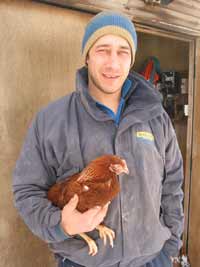Practical poultry courses get grant subsidy

New training courses for poultry and egg producers in the North and Midlands are backed by substantial grant support.
The aim is to help producers cut disease and boost productivity, performance and profits. Under the scheme, veterinary course modules normally costing £150 per delegate are priced at just £35-45.
Run by MVP Training, part of Minster Veterinary Practice, the courses are funded by LandSkills and managed by Lantra as part of the Rural Development Programme for England.
Alastair Johnston, head of MVP Training, explained. “Producers will be shown how to recognise signs of disease, giving them the opportunity to catch diseases early, before they become serious.”
Course attendance should lead to measurable benefits, including increased growth rates, improved food consumption, and improved production and quality, he predicts.
Attendance will also help producers gain and maintain accreditation with the Lion Code, RSPCA Freedom Foods, Assured Chicken Production, and Quality British Turkey. Poultry Passport approval is expected soon.
Courses cover a wide range of topics, including veterinary health, biosecurity, welfare, vaccination and medication, and laboratory procedures. Housing and the environment, egg production, food and supply chains, insect and pest control, vermin control, fire awareness, and health and safety also feature.
Some courses are split into modules, so delegates can choose which parts to attend.
MVP courses are geared to skill levels from new entrants to farmworkers and managers, and can complement an employee’s existing NVQ programme or serve as an alternative.
Case Study: Andrew Warriner, free-range egg producer
Flock performance on one North Yorkshire poultry unit improved following MVP training, leading to healthier hens and plans to pursue more training in future.
Andrew Warriner runs 22,000 free-range hens at Swainsea Barn Farm, Pickering. He said the training had shown him how to spot problems earlier. “I’m also vaccinating the pullets more often now and at a different stage. As a result they are looking really healthy.”
He attended MVP’s veterinary health courses, plus the egg production, and vaccination and medication modules, and plans to book a further two to three days shortly.
“The courses are fantastic. They’ve given me much more insight and knowledge about hens and this is helping increase production and tackle any issues with the flock.”
The training means he can now carry out basic post-mortems and communicate more clearly with vets when their assistance is required.

